Company Law: Analyzing Share Capital Reduction and Director Duties
VerifiedAdded on 2023/06/09
|9
|2594
|180
Report
AI Summary
This report provides an overview of key aspects of company law, including an explanation of pre-emptive clauses in company constitutions, their purpose, and applicability. It also discusses the reasons why companies might reduce their share capital and the legal procedures involved, referencing Section 256 B(1) of the Corporations Act of 2001. The report further examines the legal actions that creditors, ASIC, or liquidators can take against directors for insolvent trading, highlighting the duties of a liquidator and the obligations of directors in such situations. Additionally, it analyzes the rights and potential actions of a director (Chua) who is unhappy with decisions made by other directors and was removed without proper notice, referencing relevant sections of the Corporations Act 2001. Finally, the report briefly touches on various methods of raising funds, such as rights issues, preference shares, and crowd-sourced funding, referencing the Australian Securities and Investments Commission Act of 2001. Desklib provides access to similar solved assignments and study tools for students.
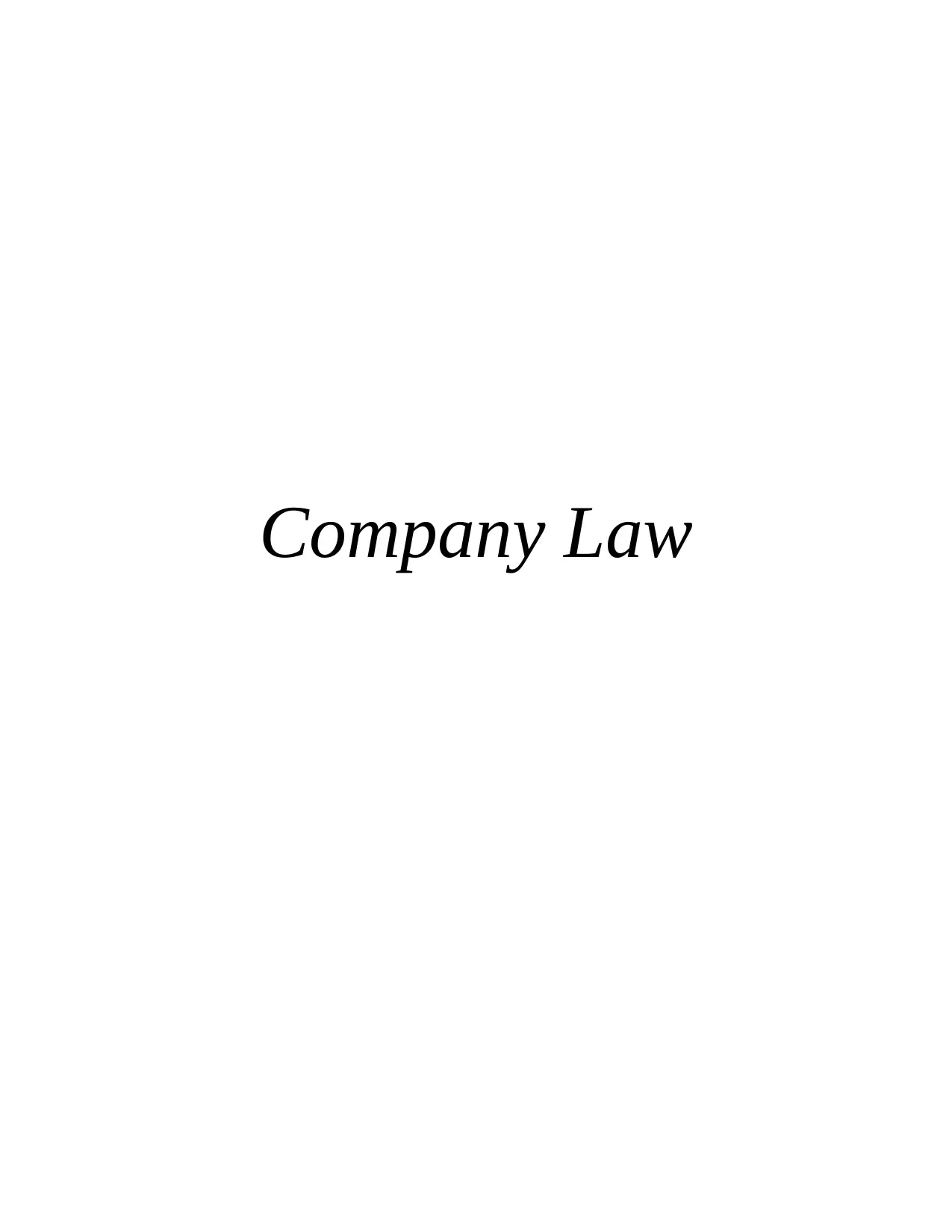
Company Law
Paraphrase This Document
Need a fresh take? Get an instant paraphrase of this document with our AI Paraphraser
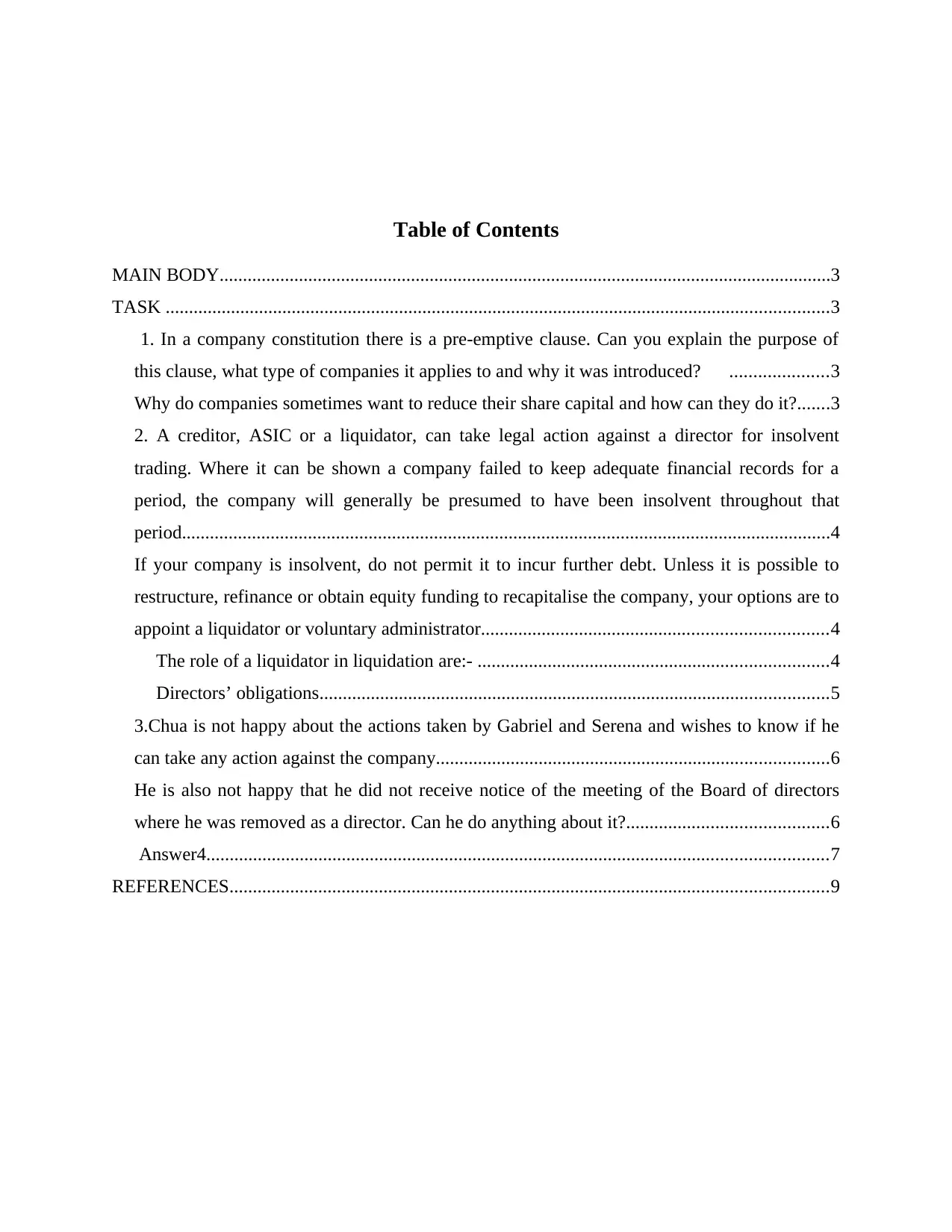
Table of Contents
MAIN BODY...................................................................................................................................3
TASK ..............................................................................................................................................3
1. In a company constitution there is a pre-emptive clause. Can you explain the purpose of
this clause, what type of companies it applies to and why it was introduced? .....................3
Why do companies sometimes want to reduce their share capital and how can they do it?.......3
2. A creditor, ASIC or a liquidator, can take legal action against a director for insolvent
trading. Where it can be shown a company failed to keep adequate financial records for a
period, the company will generally be presumed to have been insolvent throughout that
period...........................................................................................................................................4
If your company is insolvent, do not permit it to incur further debt. Unless it is possible to
restructure, refinance or obtain equity funding to recapitalise the company, your options are to
appoint a liquidator or voluntary administrator..........................................................................4
The role of a liquidator in liquidation are:- ...........................................................................4
Directors’ obligations.............................................................................................................5
3.Chua is not happy about the actions taken by Gabriel and Serena and wishes to know if he
can take any action against the company....................................................................................6
He is also not happy that he did not receive notice of the meeting of the Board of directors
where he was removed as a director. Can he do anything about it?...........................................6
Answer4.....................................................................................................................................7
REFERENCES................................................................................................................................9
MAIN BODY...................................................................................................................................3
TASK ..............................................................................................................................................3
1. In a company constitution there is a pre-emptive clause. Can you explain the purpose of
this clause, what type of companies it applies to and why it was introduced? .....................3
Why do companies sometimes want to reduce their share capital and how can they do it?.......3
2. A creditor, ASIC or a liquidator, can take legal action against a director for insolvent
trading. Where it can be shown a company failed to keep adequate financial records for a
period, the company will generally be presumed to have been insolvent throughout that
period...........................................................................................................................................4
If your company is insolvent, do not permit it to incur further debt. Unless it is possible to
restructure, refinance or obtain equity funding to recapitalise the company, your options are to
appoint a liquidator or voluntary administrator..........................................................................4
The role of a liquidator in liquidation are:- ...........................................................................4
Directors’ obligations.............................................................................................................5
3.Chua is not happy about the actions taken by Gabriel and Serena and wishes to know if he
can take any action against the company....................................................................................6
He is also not happy that he did not receive notice of the meeting of the Board of directors
where he was removed as a director. Can he do anything about it?...........................................6
Answer4.....................................................................................................................................7
REFERENCES................................................................................................................................9
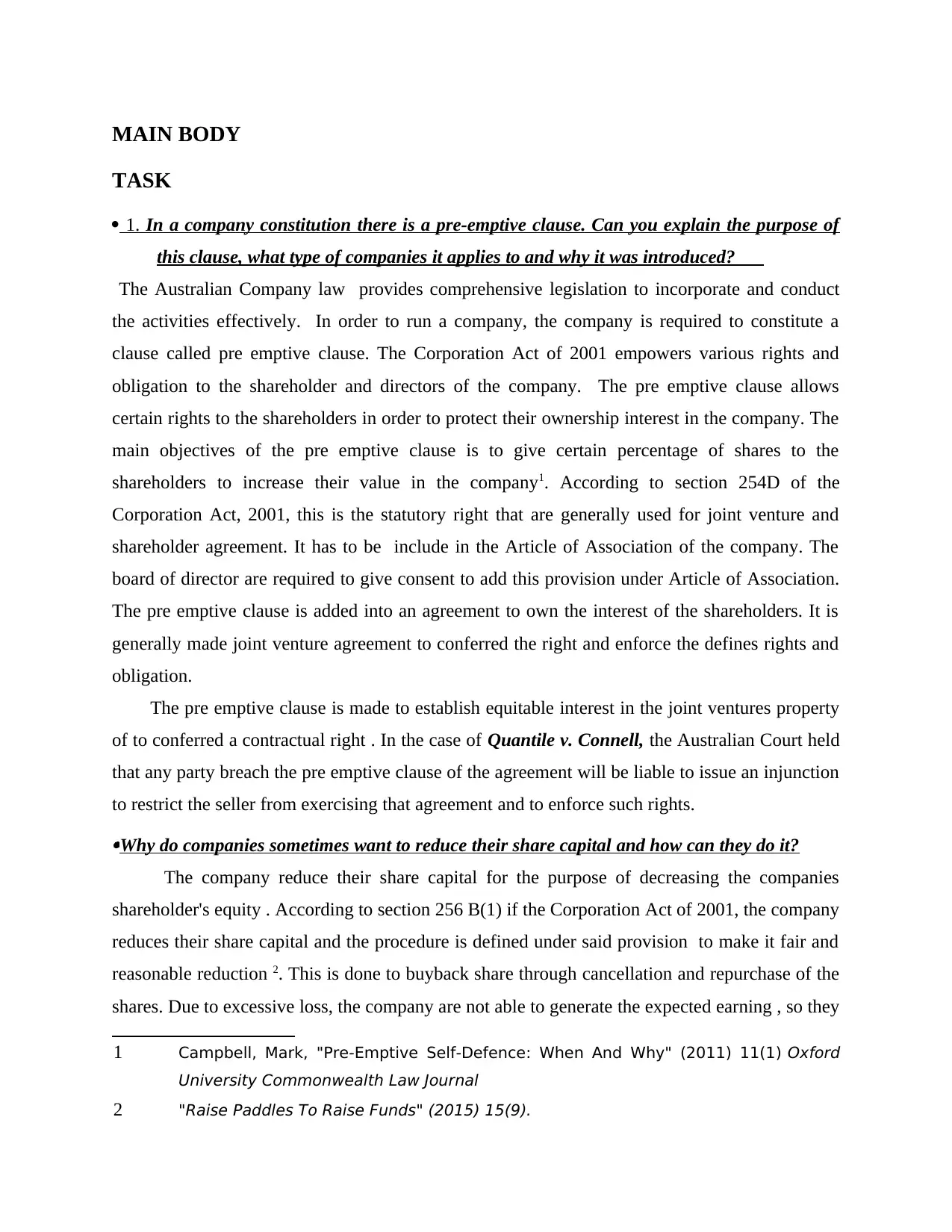
MAIN BODY
TASK
1. In a company constitution there is a pre-emptive clause. Can you explain the purpose of
this clause, what type of companies it applies to and why it was introduced?
The Australian Company law provides comprehensive legislation to incorporate and conduct
the activities effectively. In order to run a company, the company is required to constitute a
clause called pre emptive clause. The Corporation Act of 2001 empowers various rights and
obligation to the shareholder and directors of the company. The pre emptive clause allows
certain rights to the shareholders in order to protect their ownership interest in the company. The
main objectives of the pre emptive clause is to give certain percentage of shares to the
shareholders to increase their value in the company1. According to section 254D of the
Corporation Act, 2001, this is the statutory right that are generally used for joint venture and
shareholder agreement. It has to be include in the Article of Association of the company. The
board of director are required to give consent to add this provision under Article of Association.
The pre emptive clause is added into an agreement to own the interest of the shareholders. It is
generally made joint venture agreement to conferred the right and enforce the defines rights and
obligation.
The pre emptive clause is made to establish equitable interest in the joint ventures property
of to conferred a contractual right . In the case of Quantile v. Connell, the Australian Court held
that any party breach the pre emptive clause of the agreement will be liable to issue an injunction
to restrict the seller from exercising that agreement and to enforce such rights.
Why do companies sometimes want to reduce their share capital and how can they do it?
The company reduce their share capital for the purpose of decreasing the companies
shareholder's equity . According to section 256 B(1) if the Corporation Act of 2001, the company
reduces their share capital and the procedure is defined under said provision to make it fair and
reasonable reduction 2. This is done to buyback share through cancellation and repurchase of the
shares. Due to excessive loss, the company are not able to generate the expected earning , so they
1 Campbell, Mark, "Pre-Emptive Self-Defence: When And Why" (2011) 11(1) Oxford
University Commonwealth Law Journal
2 "Raise Paddles To Raise Funds" (2015) 15(9).
TASK
1. In a company constitution there is a pre-emptive clause. Can you explain the purpose of
this clause, what type of companies it applies to and why it was introduced?
The Australian Company law provides comprehensive legislation to incorporate and conduct
the activities effectively. In order to run a company, the company is required to constitute a
clause called pre emptive clause. The Corporation Act of 2001 empowers various rights and
obligation to the shareholder and directors of the company. The pre emptive clause allows
certain rights to the shareholders in order to protect their ownership interest in the company. The
main objectives of the pre emptive clause is to give certain percentage of shares to the
shareholders to increase their value in the company1. According to section 254D of the
Corporation Act, 2001, this is the statutory right that are generally used for joint venture and
shareholder agreement. It has to be include in the Article of Association of the company. The
board of director are required to give consent to add this provision under Article of Association.
The pre emptive clause is added into an agreement to own the interest of the shareholders. It is
generally made joint venture agreement to conferred the right and enforce the defines rights and
obligation.
The pre emptive clause is made to establish equitable interest in the joint ventures property
of to conferred a contractual right . In the case of Quantile v. Connell, the Australian Court held
that any party breach the pre emptive clause of the agreement will be liable to issue an injunction
to restrict the seller from exercising that agreement and to enforce such rights.
Why do companies sometimes want to reduce their share capital and how can they do it?
The company reduce their share capital for the purpose of decreasing the companies
shareholder's equity . According to section 256 B(1) if the Corporation Act of 2001, the company
reduces their share capital and the procedure is defined under said provision to make it fair and
reasonable reduction 2. This is done to buyback share through cancellation and repurchase of the
shares. Due to excessive loss, the company are not able to generate the expected earning , so they
1 Campbell, Mark, "Pre-Emptive Self-Defence: When And Why" (2011) 11(1) Oxford
University Commonwealth Law Journal
2 "Raise Paddles To Raise Funds" (2015) 15(9).
⊘ This is a preview!⊘
Do you want full access?
Subscribe today to unlock all pages.

Trusted by 1+ million students worldwide
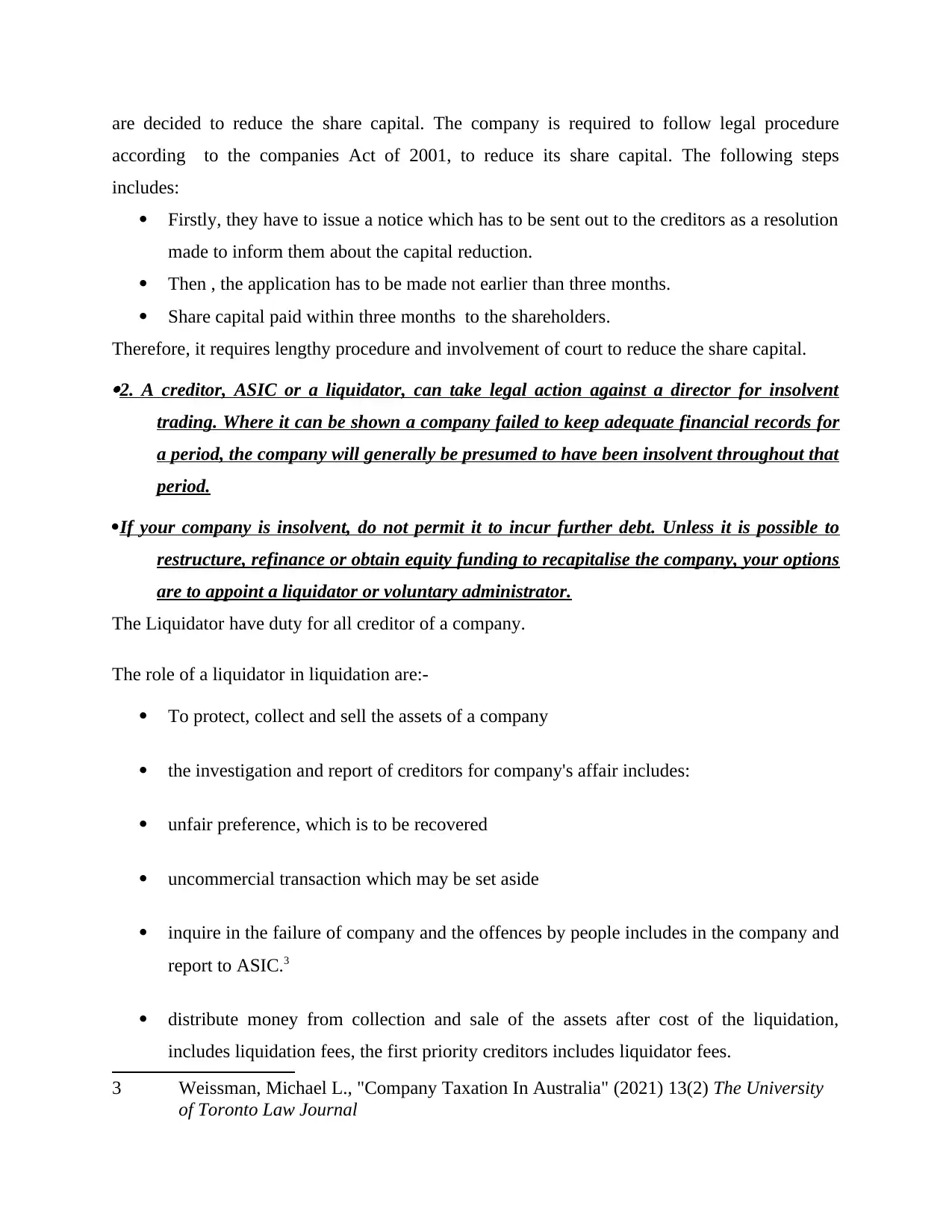
are decided to reduce the share capital. The company is required to follow legal procedure
according to the companies Act of 2001, to reduce its share capital. The following steps
includes:
Firstly, they have to issue a notice which has to be sent out to the creditors as a resolution
made to inform them about the capital reduction.
Then , the application has to be made not earlier than three months.
Share capital paid within three months to the shareholders.
Therefore, it requires lengthy procedure and involvement of court to reduce the share capital.
2. A creditor, ASIC or a liquidator, can take legal action against a director for insolvent
trading. Where it can be shown a company failed to keep adequate financial records for
a period, the company will generally be presumed to have been insolvent throughout that
period.
If your company is insolvent, do not permit it to incur further debt. Unless it is possible to
restructure, refinance or obtain equity funding to recapitalise the company, your options
are to appoint a liquidator or voluntary administrator.
The Liquidator have duty for all creditor of a company.
The role of a liquidator in liquidation are:-
To protect, collect and sell the assets of a company
the investigation and report of creditors for company's affair includes:
unfair preference, which is to be recovered
uncommercial transaction which may be set aside
inquire in the failure of company and the offences by people includes in the company and
report to ASIC.3
distribute money from collection and sale of the assets after cost of the liquidation,
includes liquidation fees, the first priority creditors includes liquidator fees.
3 Weissman, Michael L., "Company Taxation In Australia" (2021) 13(2) The University
of Toronto Law Journal
according to the companies Act of 2001, to reduce its share capital. The following steps
includes:
Firstly, they have to issue a notice which has to be sent out to the creditors as a resolution
made to inform them about the capital reduction.
Then , the application has to be made not earlier than three months.
Share capital paid within three months to the shareholders.
Therefore, it requires lengthy procedure and involvement of court to reduce the share capital.
2. A creditor, ASIC or a liquidator, can take legal action against a director for insolvent
trading. Where it can be shown a company failed to keep adequate financial records for
a period, the company will generally be presumed to have been insolvent throughout that
period.
If your company is insolvent, do not permit it to incur further debt. Unless it is possible to
restructure, refinance or obtain equity funding to recapitalise the company, your options
are to appoint a liquidator or voluntary administrator.
The Liquidator have duty for all creditor of a company.
The role of a liquidator in liquidation are:-
To protect, collect and sell the assets of a company
the investigation and report of creditors for company's affair includes:
unfair preference, which is to be recovered
uncommercial transaction which may be set aside
inquire in the failure of company and the offences by people includes in the company and
report to ASIC.3
distribute money from collection and sale of the assets after cost of the liquidation,
includes liquidation fees, the first priority creditors includes liquidator fees.
3 Weissman, Michael L., "Company Taxation In Australia" (2021) 13(2) The University
of Toronto Law Journal
Paraphrase This Document
Need a fresh take? Get an instant paraphrase of this document with our AI Paraphraser
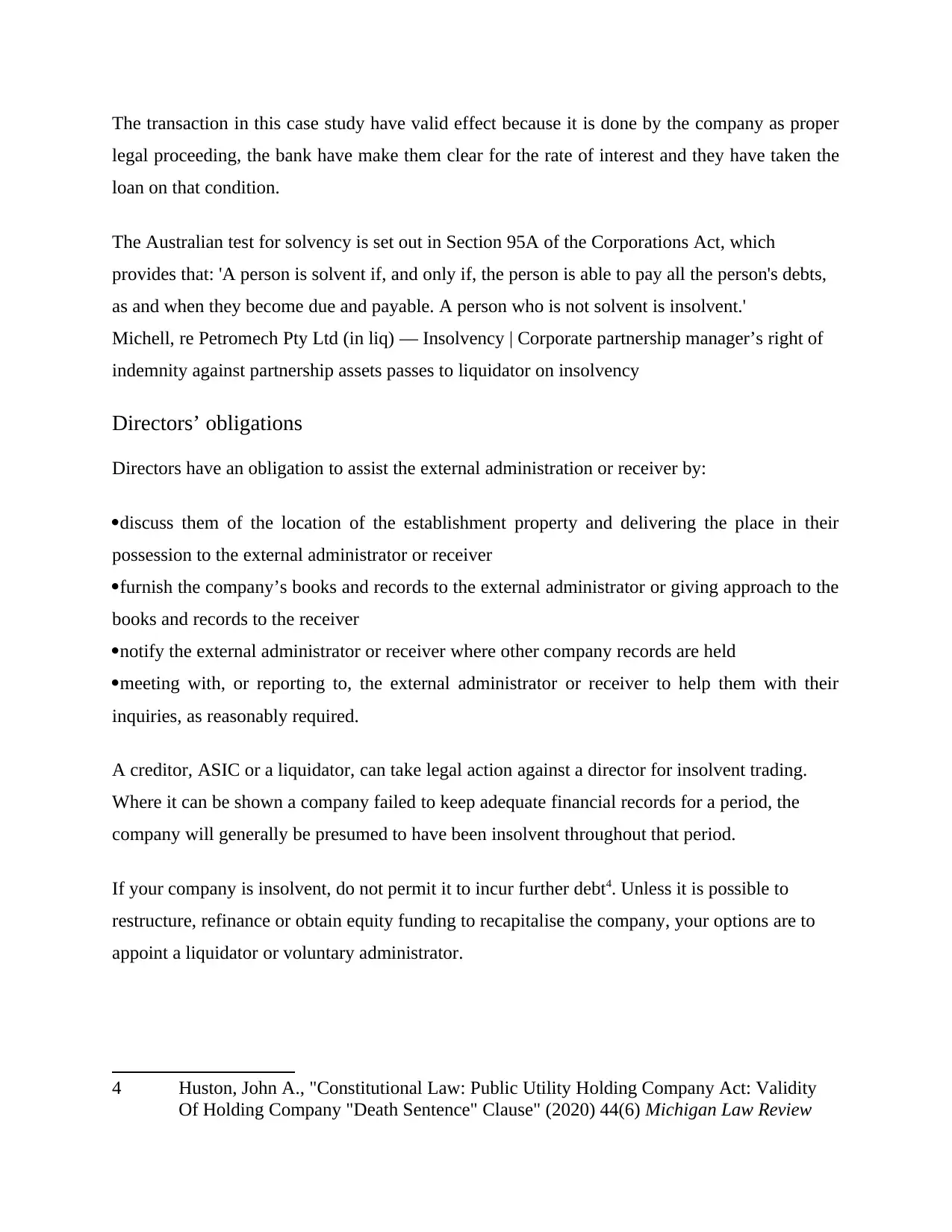
The transaction in this case study have valid effect because it is done by the company as proper
legal proceeding, the bank have make them clear for the rate of interest and they have taken the
loan on that condition.
The Australian test for solvency is set out in Section 95A of the Corporations Act, which
provides that: 'A person is solvent if, and only if, the person is able to pay all the person's debts,
as and when they become due and payable. A person who is not solvent is insolvent.'
Michell, re Petromech Pty Ltd (in liq) — Insolvency | Corporate partnership manager’s right of
indemnity against partnership assets passes to liquidator on insolvency
Directors’ obligations
Directors have an obligation to assist the external administration or receiver by:
discuss them of the location of the establishment property and delivering the place in their
possession to the external administrator or receiver
furnish the company’s books and records to the external administrator or giving approach to the
books and records to the receiver
notify the external administrator or receiver where other company records are held
meeting with, or reporting to, the external administrator or receiver to help them with their
inquiries, as reasonably required.
A creditor, ASIC or a liquidator, can take legal action against a director for insolvent trading.
Where it can be shown a company failed to keep adequate financial records for a period, the
company will generally be presumed to have been insolvent throughout that period.
If your company is insolvent, do not permit it to incur further debt4. Unless it is possible to
restructure, refinance or obtain equity funding to recapitalise the company, your options are to
appoint a liquidator or voluntary administrator.
4 Huston, John A., "Constitutional Law: Public Utility Holding Company Act: Validity
Of Holding Company "Death Sentence" Clause" (2020) 44(6) Michigan Law Review
legal proceeding, the bank have make them clear for the rate of interest and they have taken the
loan on that condition.
The Australian test for solvency is set out in Section 95A of the Corporations Act, which
provides that: 'A person is solvent if, and only if, the person is able to pay all the person's debts,
as and when they become due and payable. A person who is not solvent is insolvent.'
Michell, re Petromech Pty Ltd (in liq) — Insolvency | Corporate partnership manager’s right of
indemnity against partnership assets passes to liquidator on insolvency
Directors’ obligations
Directors have an obligation to assist the external administration or receiver by:
discuss them of the location of the establishment property and delivering the place in their
possession to the external administrator or receiver
furnish the company’s books and records to the external administrator or giving approach to the
books and records to the receiver
notify the external administrator or receiver where other company records are held
meeting with, or reporting to, the external administrator or receiver to help them with their
inquiries, as reasonably required.
A creditor, ASIC or a liquidator, can take legal action against a director for insolvent trading.
Where it can be shown a company failed to keep adequate financial records for a period, the
company will generally be presumed to have been insolvent throughout that period.
If your company is insolvent, do not permit it to incur further debt4. Unless it is possible to
restructure, refinance or obtain equity funding to recapitalise the company, your options are to
appoint a liquidator or voluntary administrator.
4 Huston, John A., "Constitutional Law: Public Utility Holding Company Act: Validity
Of Holding Company "Death Sentence" Clause" (2020) 44(6) Michigan Law Review
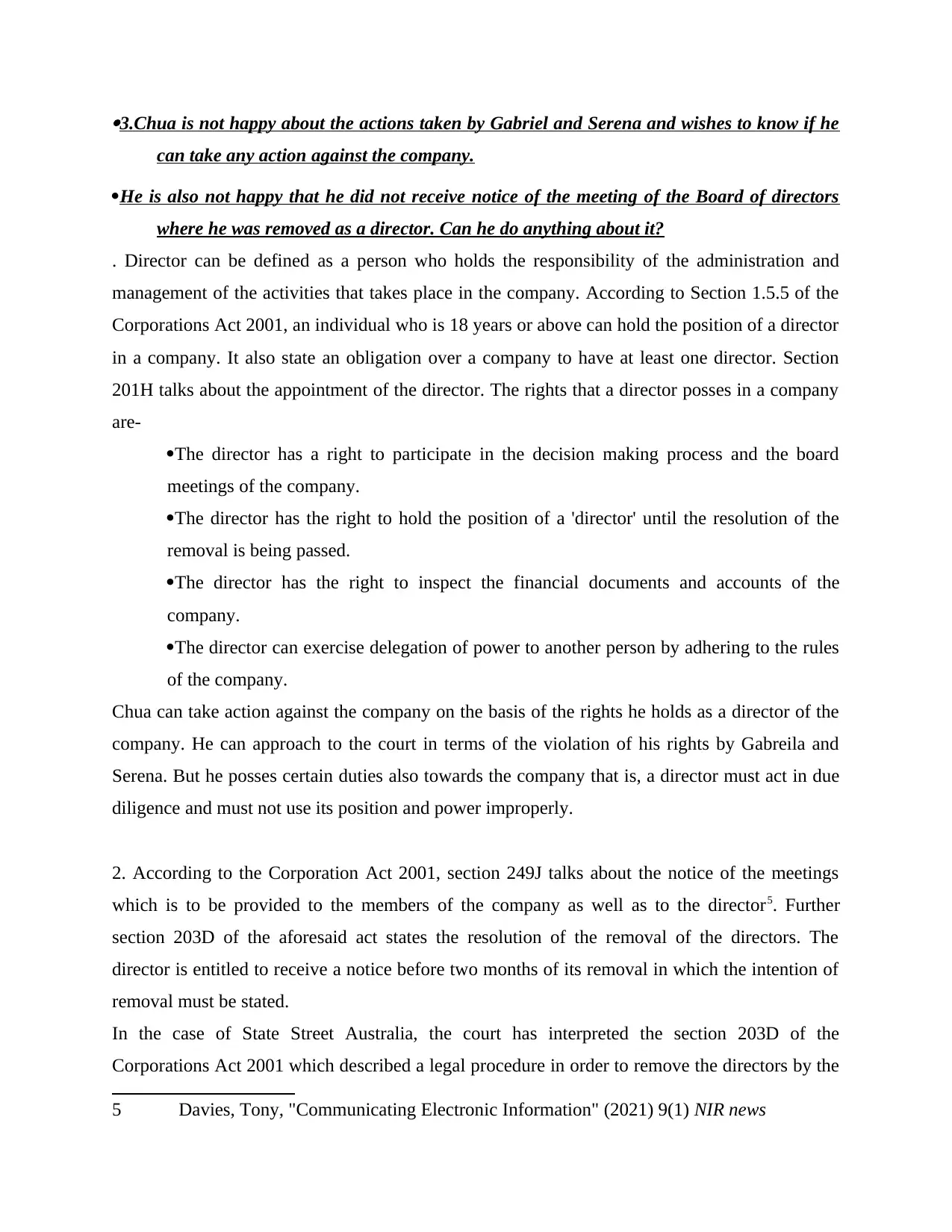
3.Chua is not happy about the actions taken by Gabriel and Serena and wishes to know if he
can take any action against the company.
He is also not happy that he did not receive notice of the meeting of the Board of directors
where he was removed as a director. Can he do anything about it?
. Director can be defined as a person who holds the responsibility of the administration and
management of the activities that takes place in the company. According to Section 1.5.5 of the
Corporations Act 2001, an individual who is 18 years or above can hold the position of a director
in a company. It also state an obligation over a company to have at least one director. Section
201H talks about the appointment of the director. The rights that a director posses in a company
are-
The director has a right to participate in the decision making process and the board
meetings of the company.
The director has the right to hold the position of a 'director' until the resolution of the
removal is being passed.
The director has the right to inspect the financial documents and accounts of the
company.
The director can exercise delegation of power to another person by adhering to the rules
of the company.
Chua can take action against the company on the basis of the rights he holds as a director of the
company. He can approach to the court in terms of the violation of his rights by Gabreila and
Serena. But he posses certain duties also towards the company that is, a director must act in due
diligence and must not use its position and power improperly.
2. According to the Corporation Act 2001, section 249J talks about the notice of the meetings
which is to be provided to the members of the company as well as to the director5. Further
section 203D of the aforesaid act states the resolution of the removal of the directors. The
director is entitled to receive a notice before two months of its removal in which the intention of
removal must be stated.
In the case of State Street Australia, the court has interpreted the section 203D of the
Corporations Act 2001 which described a legal procedure in order to remove the directors by the
5 Davies, Tony, "Communicating Electronic Information" (2021) 9(1) NIR news
can take any action against the company.
He is also not happy that he did not receive notice of the meeting of the Board of directors
where he was removed as a director. Can he do anything about it?
. Director can be defined as a person who holds the responsibility of the administration and
management of the activities that takes place in the company. According to Section 1.5.5 of the
Corporations Act 2001, an individual who is 18 years or above can hold the position of a director
in a company. It also state an obligation over a company to have at least one director. Section
201H talks about the appointment of the director. The rights that a director posses in a company
are-
The director has a right to participate in the decision making process and the board
meetings of the company.
The director has the right to hold the position of a 'director' until the resolution of the
removal is being passed.
The director has the right to inspect the financial documents and accounts of the
company.
The director can exercise delegation of power to another person by adhering to the rules
of the company.
Chua can take action against the company on the basis of the rights he holds as a director of the
company. He can approach to the court in terms of the violation of his rights by Gabreila and
Serena. But he posses certain duties also towards the company that is, a director must act in due
diligence and must not use its position and power improperly.
2. According to the Corporation Act 2001, section 249J talks about the notice of the meetings
which is to be provided to the members of the company as well as to the director5. Further
section 203D of the aforesaid act states the resolution of the removal of the directors. The
director is entitled to receive a notice before two months of its removal in which the intention of
removal must be stated.
In the case of State Street Australia, the court has interpreted the section 203D of the
Corporations Act 2001 which described a legal procedure in order to remove the directors by the
5 Davies, Tony, "Communicating Electronic Information" (2021) 9(1) NIR news
⊘ This is a preview!⊘
Do you want full access?
Subscribe today to unlock all pages.

Trusted by 1+ million students worldwide
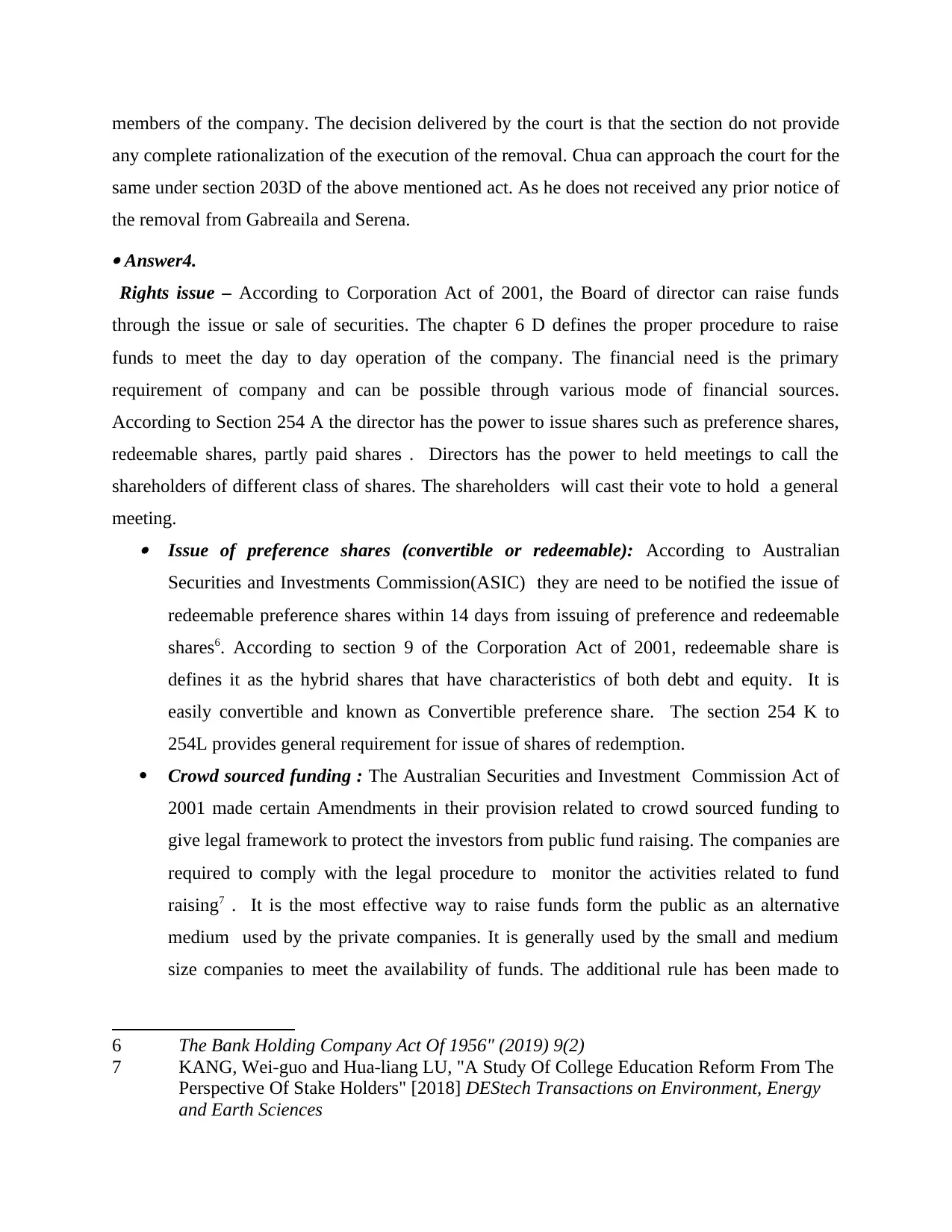
members of the company. The decision delivered by the court is that the section do not provide
any complete rationalization of the execution of the removal. Chua can approach the court for the
same under section 203D of the above mentioned act. As he does not received any prior notice of
the removal from Gabreaila and Serena.
Answer4.
Rights issue – According to Corporation Act of 2001, the Board of director can raise funds
through the issue or sale of securities. The chapter 6 D defines the proper procedure to raise
funds to meet the day to day operation of the company. The financial need is the primary
requirement of company and can be possible through various mode of financial sources.
According to Section 254 A the director has the power to issue shares such as preference shares,
redeemable shares, partly paid shares . Directors has the power to held meetings to call the
shareholders of different class of shares. The shareholders will cast their vote to hold a general
meeting. Issue of preference shares (convertible or redeemable): According to Australian
Securities and Investments Commission(ASIC) they are need to be notified the issue of
redeemable preference shares within 14 days from issuing of preference and redeemable
shares6. According to section 9 of the Corporation Act of 2001, redeemable share is
defines it as the hybrid shares that have characteristics of both debt and equity. It is
easily convertible and known as Convertible preference share. The section 254 K to
254L provides general requirement for issue of shares of redemption.
Crowd sourced funding : The Australian Securities and Investment Commission Act of
2001 made certain Amendments in their provision related to crowd sourced funding to
give legal framework to protect the investors from public fund raising. The companies are
required to comply with the legal procedure to monitor the activities related to fund
raising7 . It is the most effective way to raise funds form the public as an alternative
medium used by the private companies. It is generally used by the small and medium
size companies to meet the availability of funds. The additional rule has been made to
6 The Bank Holding Company Act Of 1956" (2019) 9(2)
7 KANG, Wei-guo and Hua-liang LU, "A Study Of College Education Reform From The
Perspective Of Stake Holders" [2018] DEStech Transactions on Environment, Energy
and Earth Sciences
any complete rationalization of the execution of the removal. Chua can approach the court for the
same under section 203D of the above mentioned act. As he does not received any prior notice of
the removal from Gabreaila and Serena.
Answer4.
Rights issue – According to Corporation Act of 2001, the Board of director can raise funds
through the issue or sale of securities. The chapter 6 D defines the proper procedure to raise
funds to meet the day to day operation of the company. The financial need is the primary
requirement of company and can be possible through various mode of financial sources.
According to Section 254 A the director has the power to issue shares such as preference shares,
redeemable shares, partly paid shares . Directors has the power to held meetings to call the
shareholders of different class of shares. The shareholders will cast their vote to hold a general
meeting. Issue of preference shares (convertible or redeemable): According to Australian
Securities and Investments Commission(ASIC) they are need to be notified the issue of
redeemable preference shares within 14 days from issuing of preference and redeemable
shares6. According to section 9 of the Corporation Act of 2001, redeemable share is
defines it as the hybrid shares that have characteristics of both debt and equity. It is
easily convertible and known as Convertible preference share. The section 254 K to
254L provides general requirement for issue of shares of redemption.
Crowd sourced funding : The Australian Securities and Investment Commission Act of
2001 made certain Amendments in their provision related to crowd sourced funding to
give legal framework to protect the investors from public fund raising. The companies are
required to comply with the legal procedure to monitor the activities related to fund
raising7 . It is the most effective way to raise funds form the public as an alternative
medium used by the private companies. It is generally used by the small and medium
size companies to meet the availability of funds. The additional rule has been made to
6 The Bank Holding Company Act Of 1956" (2019) 9(2)
7 KANG, Wei-guo and Hua-liang LU, "A Study Of College Education Reform From The
Perspective Of Stake Holders" [2018] DEStech Transactions on Environment, Energy
and Earth Sciences
Paraphrase This Document
Need a fresh take? Get an instant paraphrase of this document with our AI Paraphraser

govern the activities under CSF regime and required the companies to maintain the
following records:
The small scale company is required to made financial reporting .
The are required to conduct audit in every financial year.
The company is obliged to comply with the chapter 2 E of the corporation Act to provide
the benefit the party.
The company are exempted from takeover rule defines under chapter 6 of the corporation
Act, 2001.
following records:
The small scale company is required to made financial reporting .
The are required to conduct audit in every financial year.
The company is obliged to comply with the chapter 2 E of the corporation Act to provide
the benefit the party.
The company are exempted from takeover rule defines under chapter 6 of the corporation
Act, 2001.
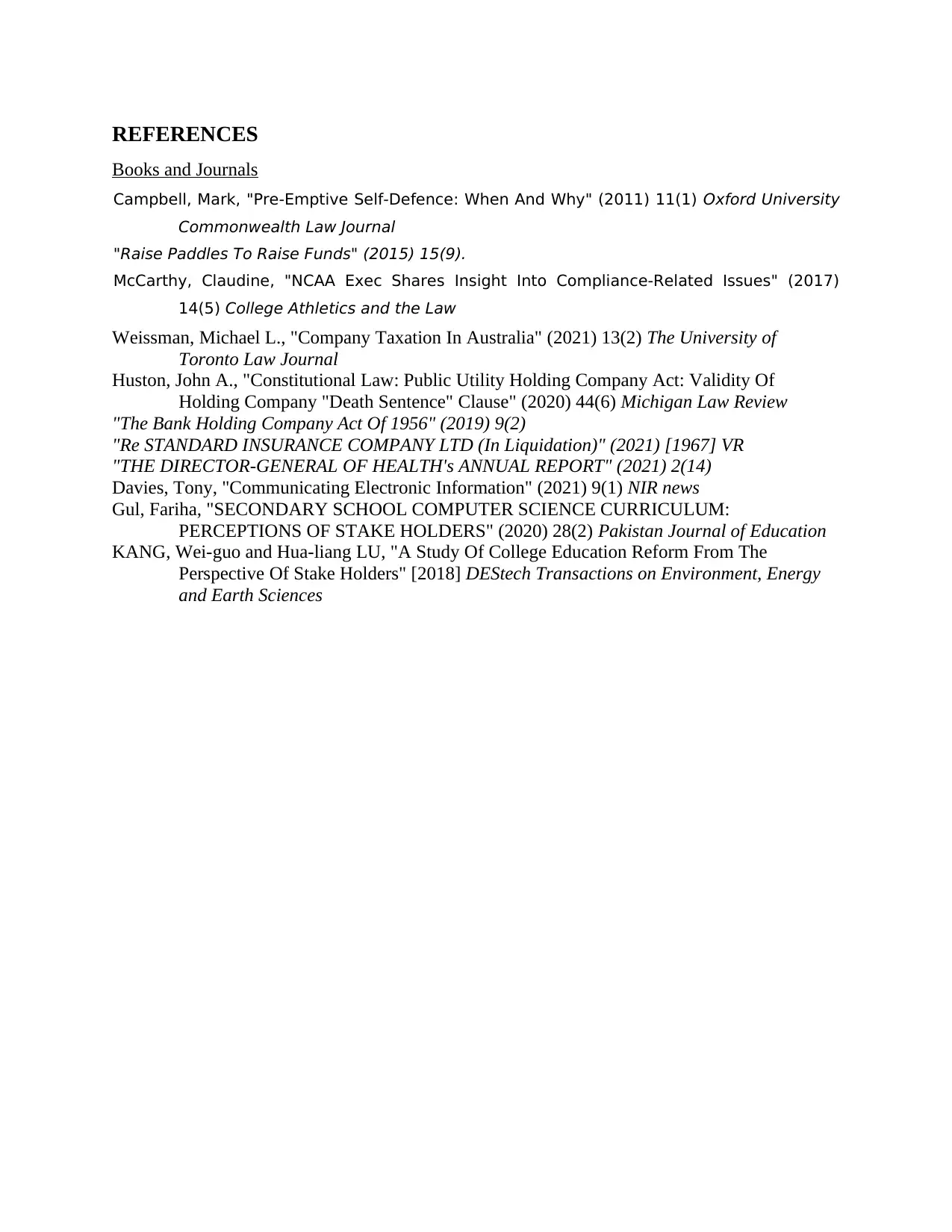
REFERENCES
Books and Journals
Campbell, Mark, "Pre-Emptive Self-Defence: When And Why" (2011) 11(1) Oxford University
Commonwealth Law Journal
"Raise Paddles To Raise Funds" (2015) 15(9).
McCarthy, Claudine, "NCAA Exec Shares Insight Into Compliance-Related Issues" (2017)
14(5) College Athletics and the Law
Weissman, Michael L., "Company Taxation In Australia" (2021) 13(2) The University of
Toronto Law Journal
Huston, John A., "Constitutional Law: Public Utility Holding Company Act: Validity Of
Holding Company "Death Sentence" Clause" (2020) 44(6) Michigan Law Review
"The Bank Holding Company Act Of 1956" (2019) 9(2)
"Re STANDARD INSURANCE COMPANY LTD (In Liquidation)" (2021) [1967] VR
"THE DIRECTOR‐GENERAL OF HEALTH's ANNUAL REPORT" (2021) 2(14)
Davies, Tony, "Communicating Electronic Information" (2021) 9(1) NIR news
Gul, Fariha, "SECONDARY SCHOOL COMPUTER SCIENCE CURRICULUM:
PERCEPTIONS OF STAKE HOLDERS" (2020) 28(2) Pakistan Journal of Education
KANG, Wei-guo and Hua-liang LU, "A Study Of College Education Reform From The
Perspective Of Stake Holders" [2018] DEStech Transactions on Environment, Energy
and Earth Sciences
Books and Journals
Campbell, Mark, "Pre-Emptive Self-Defence: When And Why" (2011) 11(1) Oxford University
Commonwealth Law Journal
"Raise Paddles To Raise Funds" (2015) 15(9).
McCarthy, Claudine, "NCAA Exec Shares Insight Into Compliance-Related Issues" (2017)
14(5) College Athletics and the Law
Weissman, Michael L., "Company Taxation In Australia" (2021) 13(2) The University of
Toronto Law Journal
Huston, John A., "Constitutional Law: Public Utility Holding Company Act: Validity Of
Holding Company "Death Sentence" Clause" (2020) 44(6) Michigan Law Review
"The Bank Holding Company Act Of 1956" (2019) 9(2)
"Re STANDARD INSURANCE COMPANY LTD (In Liquidation)" (2021) [1967] VR
"THE DIRECTOR‐GENERAL OF HEALTH's ANNUAL REPORT" (2021) 2(14)
Davies, Tony, "Communicating Electronic Information" (2021) 9(1) NIR news
Gul, Fariha, "SECONDARY SCHOOL COMPUTER SCIENCE CURRICULUM:
PERCEPTIONS OF STAKE HOLDERS" (2020) 28(2) Pakistan Journal of Education
KANG, Wei-guo and Hua-liang LU, "A Study Of College Education Reform From The
Perspective Of Stake Holders" [2018] DEStech Transactions on Environment, Energy
and Earth Sciences
⊘ This is a preview!⊘
Do you want full access?
Subscribe today to unlock all pages.

Trusted by 1+ million students worldwide
1 out of 9
Related Documents
Your All-in-One AI-Powered Toolkit for Academic Success.
+13062052269
info@desklib.com
Available 24*7 on WhatsApp / Email
![[object Object]](/_next/static/media/star-bottom.7253800d.svg)
Unlock your academic potential
Copyright © 2020–2026 A2Z Services. All Rights Reserved. Developed and managed by ZUCOL.





